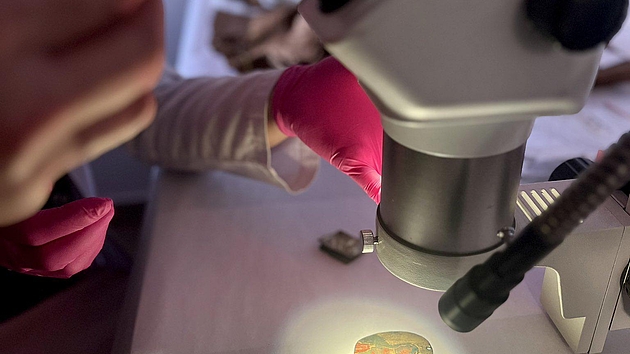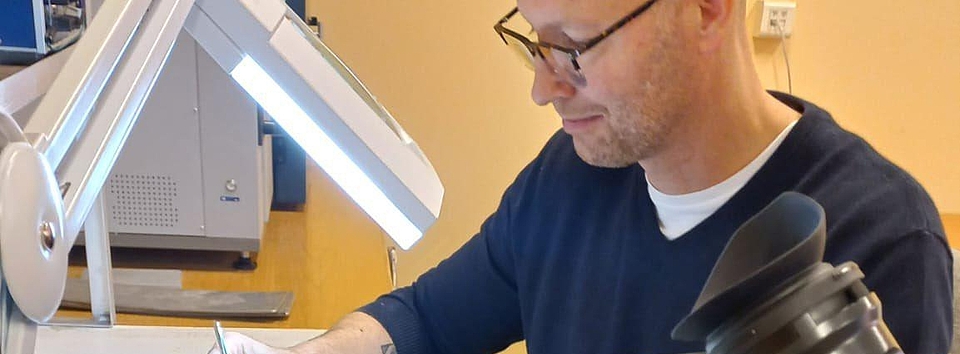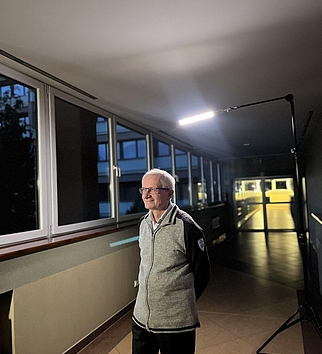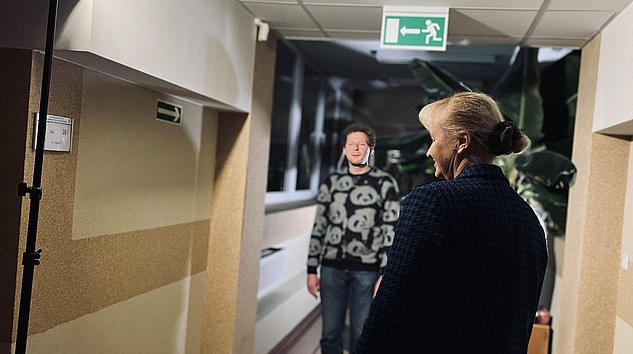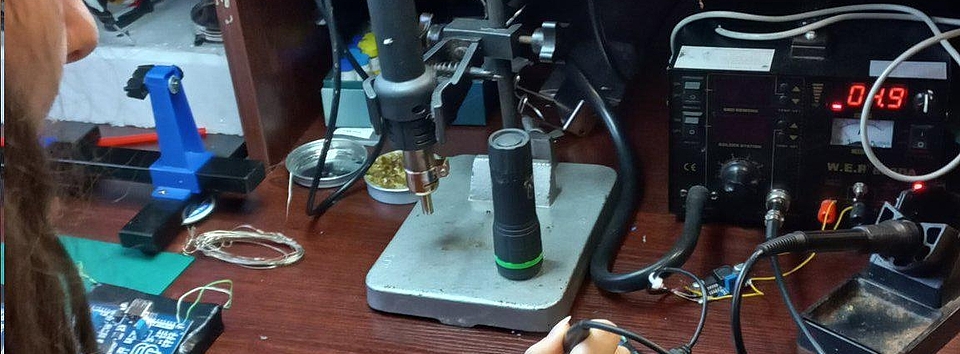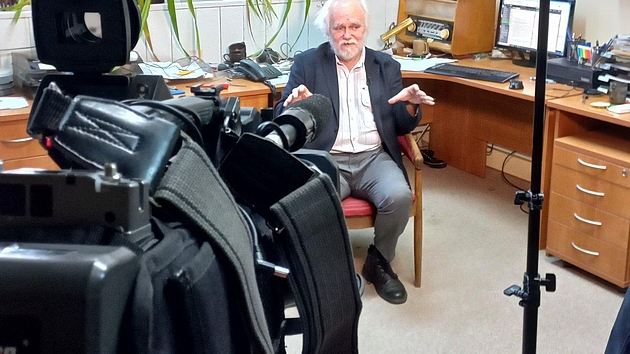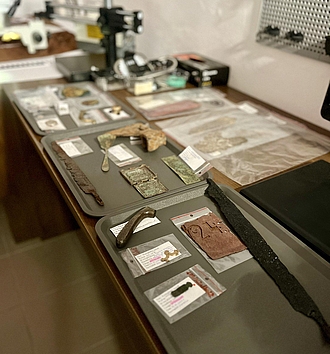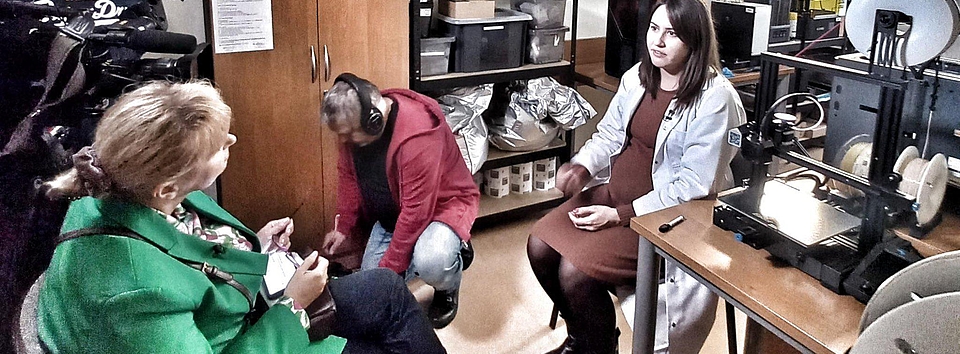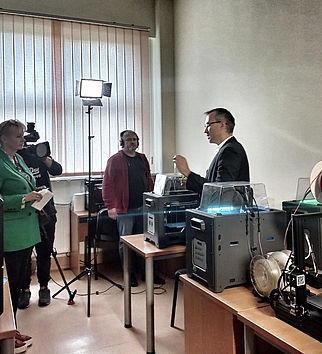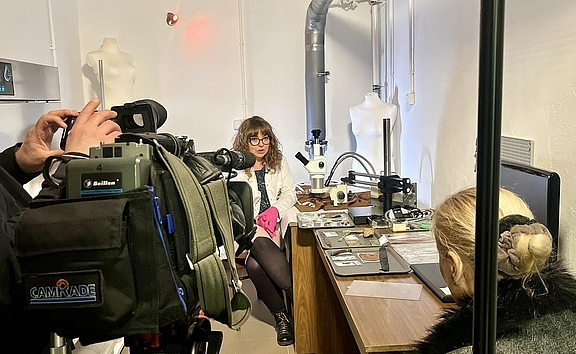The idea of the TV show is to present scientists from Lodz universities and institutes at their daily work – in laboratories, during research and analyses, using specialised and modern equipment.
Passion and curiosity about the world in stories about science
Thanks to the TV show, we have the opportunity to go on a journey through the university's corridors, look into studios and laboratories, and hear about research conducted at the University of Lodz. Scientists can share their scientific discoveries, arouse interest and inspire the audience – they can show that science is actually very interesting.
The University of Lodz researchers have already talked, among other things, about 3D printing and sensors that detect drugs. A team from the Faculty of Chemistry of the University of Lodz, i.e. Dr Łukasz Półtorak, Associate Professor at the University of Lodz, Dr Konrad Rudnicki, Dr Karolina Kwaczyński brought the topic closer to the audience.
Sensors are, in other words, devices thanks to with which we can detect a number of different physical, chemical and similar factors. We focus on electrochemical sensors, i.e. devices that are able to detect various types of chemicals, metals, drugs or psychotropic substances by analysing electrical signals. It is a case that has been created using 3D printing technology
– said Dr Łukasz Półtorak, Associate Professor at the University of Lodz.
Sensory i druk 3D – Wydział Chemii UŁ (Łódzka Nauka) [Sensors and 3D printing – Faculty of Chemistry, University of Lodz (Łódzka Nauka)]
The researchers also talked about physics in medicine. A team from the Faculty of Physics and Applied Informatics at the University of Lodz, i.e. Dr Małgorzata Wrzesień, Associate Professor at the University of Lodz, Dr Piotr Pankowski, mgr inż. Maciej Ślot presented, among other things, a phantom imitating the human body, which is used to measure radiation exposure in research and treatment.
"Edward" is an anthropomorphic phantom of an adult human (male), which is used which is used to assess exposure, i.e. to measure doses, both among patients and staff working under exposure conditions, to ionizing radiation. The characteristic feature of our phantom is primarily that it is composed of structures that are equivalent to those of an adult living person
– said Dr Małgorzata Wrzesień, Associate Professor at the Nuclear Radiation and Dosimetry Laboratory at the University of Lodz.
Fizyka w medycynie i fantom – Wydział Fizyki i Informatyki Stosowanej (Łódzka Nauka) [Physics in medicine and a phantom – Faculty of Physics and Applied Informatics, University of Lodz (Łódzka Nauka)]
Scientists from the University of Lodz Department of Astrophysics, i.e. Dr Dorota Sobczyńska, Associate Professor at the University of Lodz, Prof. Włodzimierz Bednarek, Prof. Julian Sitarek spoke about the astronomical observatory in the Canary Islands, Cherenkov telescopes and gamma radiation.
Our observations have yielded some exceptional results – first of all, in cooperation with several European and non-European countries, we have discovered strong gamma-ray emission from the magnetospheres of neutron stars. We have also discovered emission from multiple extragalactic sources associated with the central supermassive black hole
– said Prof. Włodzimierz Bednarek.
Teleskopy czerenkowskie i promieniowanie gamma – Katedra Astrofizyki UŁ (Łódzka Nauka) [Cherenkov telescopes and gamma rays – Department of Astrophysics, University of Lodz (Łódzka Nauka)]
Thanks to detectors being developed at the University of Lodz, high school students can study elementary particles reaching us from space. A team from the Department of Theoretical Physics at the University of Lodz, i.e. Prof. Tadeusz Wibig, mgr Michał Karbowiak, together with students from high schools in Lodz are investigating, among other things, large cosmic showers by building detectors.
The detector is used to catch signals that are produced by elementary particles that come to us, and we want to see these particles. However, you cannot see them because they are small in size, and you actually have to use special instruments. We have built such detectors
– explained Prof. Tadeusz Wibig.
Detektory i wielkie pęki kosmiczne – Katedra Fizyki Teoretycznej UŁ (Łódzka Nauka) [Detectors and large cosmic showers - Department of Theoretical Physics, University of Lodz (Łódzka Nauka)]
In turn, scientists from the Institute of Archaeology at the University of Lodz, i.e. Dr Magdalena Majorek-Lipowicz, Dr Artur Ginter, archaeology student Zuzanna Woźniak talked about methods of identification and analysis of geological artifacts and samples.
In our laboratory, we analyse artifacts that come from different eras and are made of different raw materials. These are mostly archaeometric methods involving the study of stellar composition, i.e. what the artefact is actually made of. These are microscopic analyses, where we observe both what the artefact was made of and how it was made. At the same time, we also have opportunities to spend on artifacts
– explained Dr Artur Ginter from the Laboratory of Dating and Conservation of Artifacts, Faculty of Philosophy and History.
Identyfikacja i analiza zabytków i próbek geologicznych (Łódzka Nauka) [Identification and analysis of geological artifacts and samples (Łódzka Nauka)]
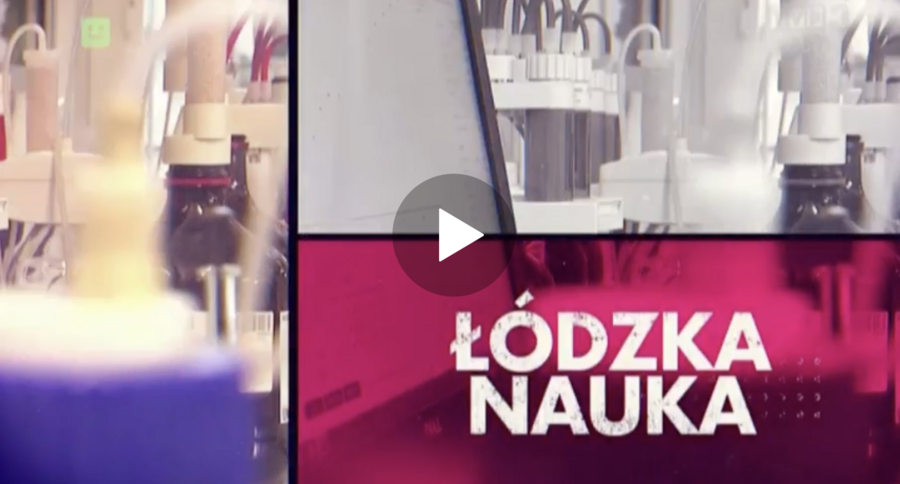
Science at the University of Lodz – to inspire and share achievements
Participation in the Łódzka Nauka show is one way of disseminating science at the University of Lodz. We were dedicated to conducting reliable research in 2023. Important research and numerous publications are the result of the collective efforts of our talented team.
There are more and more scientists willing to cooperate with the media and journalists often turning to our scientists for expert help. We also meet at regular meetings organised by the University of Lodz Press Office – Press Breakfasts of the University of Lodz is a project aiming at establishing and maintaining relations between the media and the university. It was initiated in December 2022. During these regular meetings of scientists, doctoral students and students with journalists, the expert knowledge of researchers from the University of Lodz is presented and topics from the life of the university are discussed. Above all, it is time for conversation, spontaneous exchange of opinions and sharing ideas, as well as networking.
Last year, a new project Science Inspires was also launched. We publish short interviews with scientists, in which we ask them about their inspirations for choosing a scientific career and translating their work into real actions for society. Videos and the new YouTube channel, Science Inspires constitute an important part of this project.
More about science and research at the University of Lodz
Source: Iwona Ptaszek-Zielińska, Communications and PR Centre, University of Lodz
Photos: University of Lodz
The mission of the University of Lodz is to conduct reliable research and actively disseminate facts and research results so as to wisely educate future generations, be useful to society and courageously respond to the challenges of the modern world. Scientific excellence is always our best compass. Our values include: courage, curiosity, commitment, cooperation and respect.

